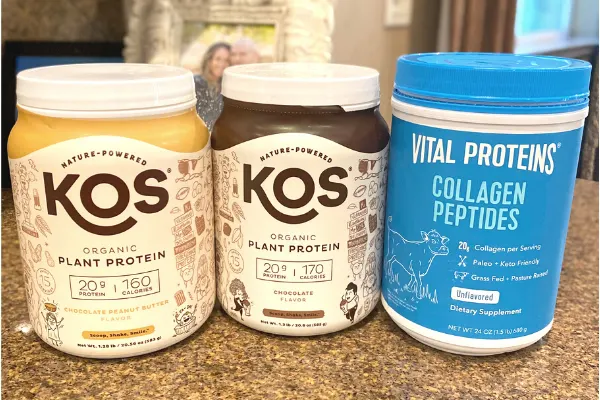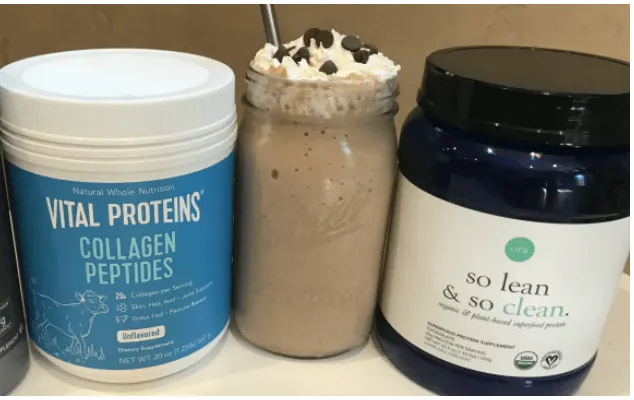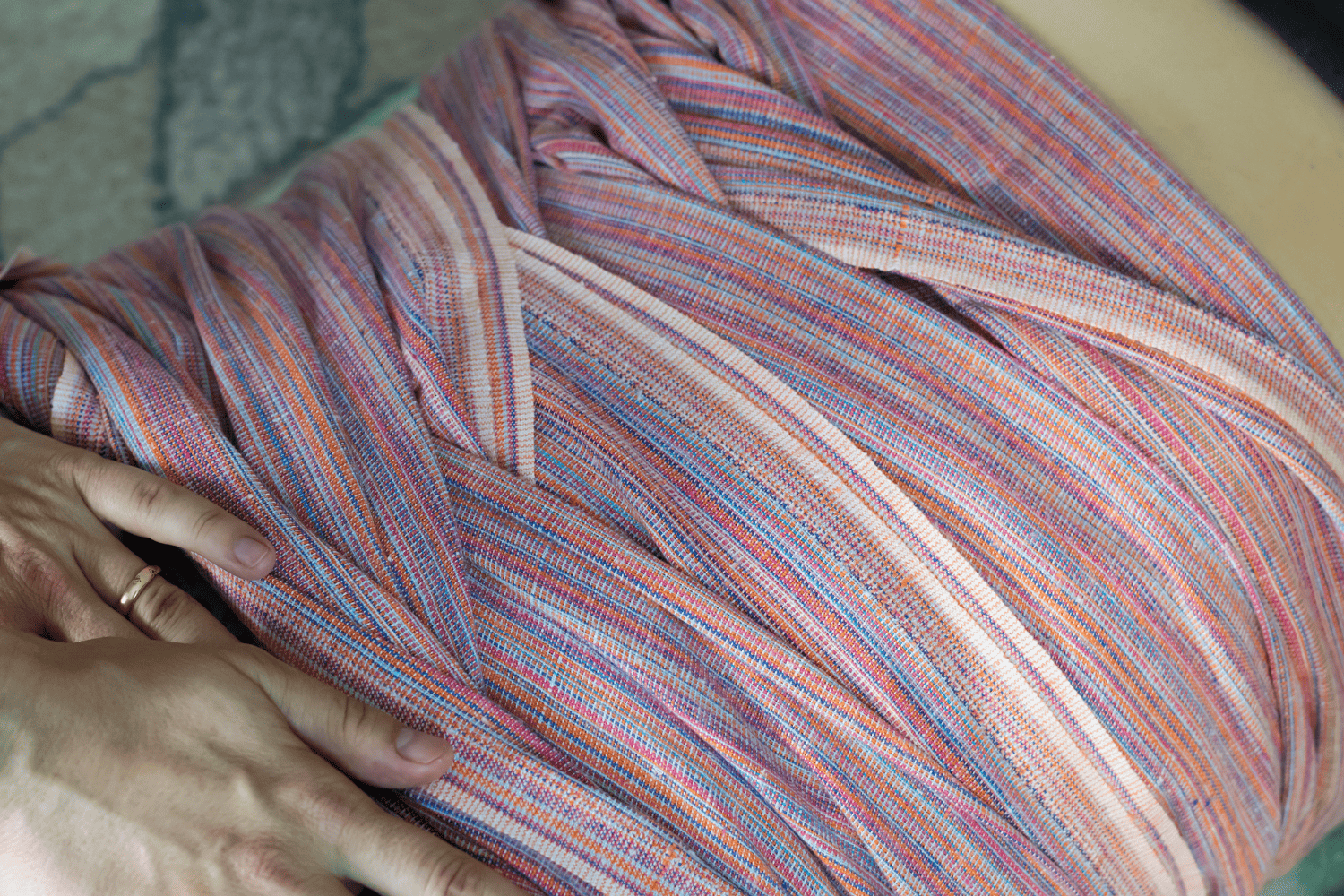Pregnancy & Protein Powder: 6 Safest Options
(This post probably contains affiliate links. I receive a small commission at no cost to you through links shared on this website to help keep the information I provide free to you)
Inside: Protein serves as the foundation for your baby’s organs, tissues, and cells while also providing the energy you need to power through your day. Adding a scoop of protein powder to your favorite smoothies or coffee drink is great way to meet the extra protein requirements during pregnancy, but is it safe? And what type of protein powder is best option during pregnancy? I’ve done all the research for you!
During pregnancy, it is only natural to worry about everything thing you put in your body.
Protein is an essential nutrient that plays an important role not only in muscle growth, but it is also needed for the development of your baby’s organs, tissues and cells.
However, getting enough protein can be challenging, especially during the first trimester when many moms experience morning sickness.
Today we will dive into everything you need to know about protein powder during pregnancy so you can choose the best one for you and your growing baby.
I want you to feel confident and excited about fueling your body with the essential nutrients it needs to thrive during pregnancy!

However, before taking my advice, always consult with you healthcare provider when starting or continuing any supplements or exercise routines during pregnancy.
Disclosure: Although I am a certified prenatal/postnatal exercise specialist and personal trainer, I am not YOUR trainer. The content on this blog is for informational purposes only and should not be a substitute of the information and advice you receive from a healthcare professional. This website does not replace the medical advice you receive from your provider.
How Much Protein Do Pregnant Women Need?
It comes as no surprise that dietary needs change during pregnancy to support both fetal growth as well as your body.
As a result, the recommended protein intake increases to meet the demands of both.
How much protein your body needs during pregnancy depends on a few factors such as your physical activity level, body weight and how far along you are.
A good average daily intake should be around 75-100 grams of protein depending on your body weight.
The amount of protein your body requires will change during your pregnancy because your weight is changing but this is a good range.
What Are the Different Types of Protein Powders
There are a variety of different protein powders on the market to choose from, but not all protein powder is created equal.
Here are a few different types of protein powders available today:

What Are the Benefits of Protein During Pregnancy?
One of the most obvious benefits of protein powder is that it helps provide a quick and convenient source of protein for pregnant moms who may not be able to get enough through their diet alone.
And you can up the nutritional value by adding fruits, vegetables and even nut butters.
But protein also has some other benefits, including:
Protein powder should not be taken as a sole source of protein because it does not contain all other nutrients required by the human body like carbohydrates and fats.
However, in conjunction with a balanced diet and protein-rich foods, it can help fill in nutritional gaps.
Related: The Truth About Pregnancy Weight Gain (and Why It Matters)
What Are the Risks of Protein During Pregnancy?
One concern many women have is that protein supplements are not regulated by the food and drug administration.
This doesn’t mean they are unsafe to consume but it’s best to look for one that has been third-party tested and made the only the highest quality ingredients.
If the ingredient list is long a full of words you cannot pronounce, I would suggest looking for another option.
Protein powders also lack essential nutrients of a healthy diet and may even contain trace amounts of mercury, heavy metals and lead, so be sure to opt for brands with only natural ingredients and no artificial flavors, colors or sweeteners.
It is always a good idea to consult with your healthcare provider before starting or continuing any dietary supplements during pregnancy.
Is Protein Powder Safe For Pregnancy?
Overall, protein powders are considered safe during pregnancy and can help meet daily protein intake requirements when it’s difficult to consume a high protein diet.
There has not been any research to show that protein powders cause any harm to moms or their growing babies but it is always important to run it by your doctor or nutritionist.
However, protein powders should not be a replacement for natural food sources such as lean meats and should only be used in conjunction with a healthy diet.
What Are the Best Pregnancy Safe Protein Powder?
Here are my top picks for protein powder during pregnancy.
All of these have been hand selected based on personal experience, ingredients and nutritional content.
The one you choose will boil down to preference in taste, cost and digestion.
Always consult with your healthcare provider to be sure protein powder is safe for you and your pregnancy.

KOS Organic Superfood Protein (personal favorite)
Cost per serving: $1.53 (with subscription)
20g of protein per serving. A vegan protein powder that combines blend of Pea, Flax Seed, Quinoa, Pumpkin Seed & Chia Seed + essential vitamins & minerals.
Pros: Cons:
Ora Organic (personal favorite)
Cost per serving: $1.80 (with subscription)
21g of organic protein per serving. Heavy metal tested and sourced from USDA organic certified farms. This is a great protein for sensitive stomachs and my kids even love it.
Pros: Cons:
Orgain Organic Protein
Price per serving: $1.29 (with subscription)
21 grams of organic protein per serving. Great tasting and family friendly protein powder.
Pros: Cons:
Naked Whey
Cost per serving: $1.50 (with subscription)
25 grams of protein per serving. A great tasting whey protein with only three ingredients. The brand also offers a pea protein blend, and plant based option.
Pros: Cons:
Fairlife Core Power
Price per serving: $2.86 (with subscription)
26 grams of protein per serving. A great tasting protein that comes in a variety of flavors. A convenient on-the-go option when your don’t want a messy shaker cup. This is not one I would drink daily but a great option for convenience.
Pros: Cons:
Garden of Life Raw Protein
Price per serving: $1.70 (with subscription)
22 grams of protein per serving and only 110 calories, depending on the flavor. Easy to digest and contains probiotics and digestive enzymes.
Pros: Cons:What To Look For In a Protein Powder
If you and your healthcare provider determine that supplementing with protein shakes is safe for you and your pregnancy, here are a few things to consider when choosing the best protein powder for pregnancy.
(Carrageen is a seaweed that is used as a thickener and stabilizer to help protein powders mix better. While it is a natural substance, it has been shown to increase inflammation in the body and trigger ulcerations, bleeding and some cancers. Source.)
Related: The Ultimate Thick And Creamy Chocolate Peanut Butter Protein Shake

How to Pick the Best Protein Powders During Pregnancy
Now that you know the benefits, risks and different types of products available, here are a few tips to help you get the most bang for your buck when choosing the best protein powder for you and your pregnancy.
How to choose the best protein powder for your pregnancy:
Do I Really Need Protein Powder In My Diet During Pregnancy?
We know protein is a major nutritional requirement for pregnant women.
However, protein sources can be limited during pregnancy because of food aversions, nausea and morning sickness.
For these reasons, protein powder is often used by pregnant women who are unable to get enough protein from food sources.
Incorporating protein shakes into your daily diet can be a quick and efficient way to get protein and other nutrients when you struggle to meet nutritional requirements.
However, protein shakes should not replace a healthy meal or snack during pregnancy.
It’s important to combine protein powder with whole foods and a prenatal vitamin for a healthy pregnancy.
Bottom Line-To Protein Powder or to Not Protein Powder
It’s only natural to be worried about everything you consume during pregnancy so I hope this helped you feel more confident in supplementing with protein powder during pregnancy.
If food aversions and nausea are making it difficult for you to get enough protein during pregnancy, then protein shakes are the best way to make sure you meet your protein needs.
Remember, protein consumption is only one piece of the puzzle when it comes to a healthy pregnancy! You always want to make sure you are eating a variety of fruits, vegetables, carbohydrates and fats to make sure you are getting the essential vitamins and nutrients your body needs during the special time.
FACT CHECK
Struggles of a Fit Mom uses only high-quality sources, including peer-reviewed studies, to support the facts within it’s articles. Read my editorial process to learn more about how I fact-check and keep my content accurate, reliable, and trustworthy.
American Pregnancy Association. (2022, May 5). Pregnancy Nutrition. https://americanpregnancy.org/healthy-pregnancy/pregnancy-health-wellness/pregnancy-nutrition/
Elango R, Ball RO. Protein and Amino Acid Requirements during Pregnancy. Adv Nutr. 2016 Jul 15;7(4):839S-44S. doi: 10.3945/an.115.011817. PMID: 27422521; PMCID: PMC4942872.

Brooke is a certified Prenatal and Postnatal Exercise Specialist with a Bachelors of Science degree in Kinesiology-Exercise Science. She is also a mom of 3 girls with more than 15 years of experience in health and fitness. Brooke’s goal at Struggles of a Fit Mom is to help motivate, educate and inspire other busy mamas who struggle with finding time, energy and motivation to take care of themselves in the chaos of motherhood.







